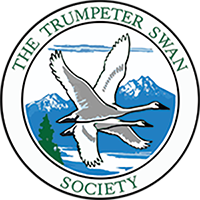Photograph by Dan Staples of Minnesota Trumpeter Swan 0R at Loess Bluffs National Wildlife Refuge, Missouri. The GPS/GSM collared swan is part of the largest Midwest Trumpeter Swan tracking study ever done. More than 100 Trumpeter Swans are being publicly tracked for 3 years. The website is through the University of Minnesota. https://trumpeterswan.netlify.app/last_7days_locations.html
Call for Abstracts
The Scientific Committee now welcomes abstracts for presentations on any aspects of swan biology, ecology and conservation at the 7th International Swan Symposium/26th Conference of the Trumpeter Swan Society. Topics may include, but are not limited to: habitat use and site selection, foraging ecology, behaviour, natural history, population trends and dynamics, genetics studies, migration and movements, breeding biology and the outcome of conservation initiatives.
We would particularly welcome presentations focused on the following:
Threats to swan species, e.g.:
- Lead poisoning
- Collisions with infrastructure
- Harvest (legal hunting, illegal hunting, motivation of hunters, context for hunting)
- Resolving conflicts with other human activity (agriculture, hunting, recreational use, infrastructure development)
Effects of climate change on swan species at their breeding, wintering and staging areas. For instance, changes in:
- Distribution
- Timing of migration
- Food resources
- Mitigation required to safeguard sites for swans
Habitat and landscape use, including:
- Factors affecting the swans use of feeding areas and roost sites
- Outcome of habitat creation/protection/management measures
Population surveys and monitoring, with data analysed to elucidate:
- Population development
- Population delineation and exchange (results of resighting/tracking/genetic studies)
- Vital rates
- Population management
Abstract submission guidelines are provided below. Please note that abstracts should be submitted by completing the Abstract Submission Form (as a Word document; not PDF) and sending it by email to Dr Eileen Rees at ReesEileenC@gmail.com. Please also note that the deadline for submission of abstracts is Saturday, 30 April 2022. Abstracts submitted after this date may not be considered by the Committee.
In preparing abstracts, please use the Abstract Submission Form to submit your abstract and ensure that:
- The abstract is prepared as an MS Word document or equivalent
- The first word in the first line of the abstract page (in bold font and capital letters) should indicate your first choice regarding presentation options: TALK or POSTER
- The main subject area of the presentation is indicated
- The title of the presentation is given in bold font
- Names and affiliations for all authors included, with email address also included for the first/correspondence author
- The text for the abstract should be concise, should focus on the main aims and findings of the study, and be no more than 300 words.
The Scientific Committee will consider the abstracts with a view to providing a decision regarding the presentation by 15 June 2022.
We look forward to receiving the Abstracts.
Best regards
The Scientific Committee
Eileen Rees (Chair IUCN-SSC Swan Specialist Group, United Kingdom)
Bart Nolet (Netherlands Institute of Ecology, Netherlands)
Craig Ely (US Geological Survey, United States of America)
Dave Delehanty (Idaho State University, United States of America)
Diana Solovyeva (Russian Academy of Sciences, Russia)
Dmitrijs Boiko (Latvian National Museum of Natural History, Latvia)
John Cornely (The Trumpeter Swan Society, United States of America)
Lei Cao (Chinese Academy of Sciences, China)
Preben Clausen (Aarhus University, Denmark)
Jeff Snyder (Western Oregon University, United States of America)
Radosław Włodarczyk (University of Łódź, Poland)

